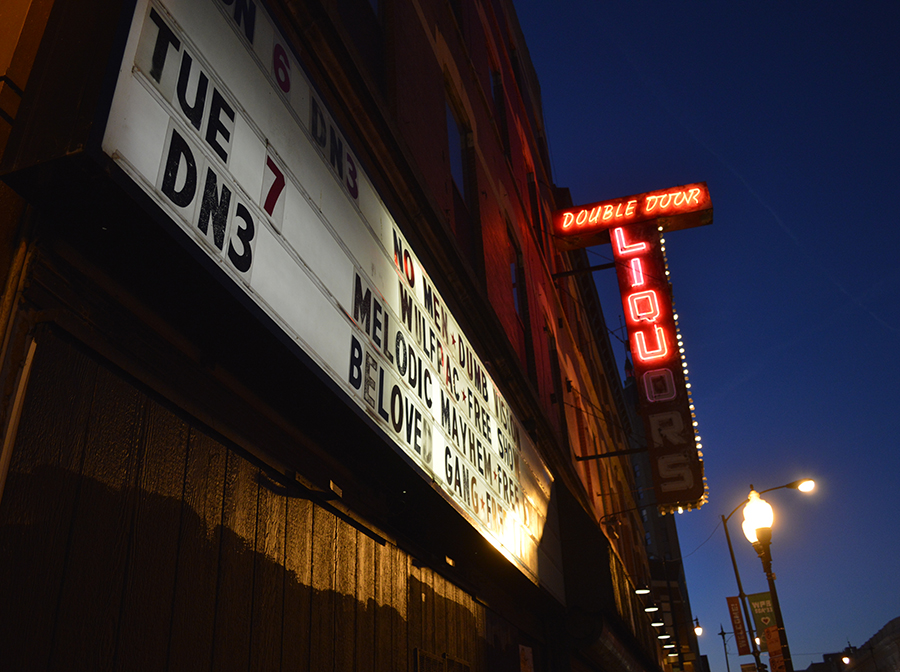Worth of this Place
WHEN WICKER PARK'S MUSIC SCENE COLLIDES WITH GENTRIFICATION
“If I log into my Facebook account, every single artist I know has a broken heart emoji,” said Maas of Double Door closing. “If you look outside today, someone who has just moved to Chicago will never know what they’ve missed.”
Photo by Audrey Valbuena
They say that when one door closes, another opens.
HOWEVER, THAT MAY NOT BE THE CASE FOR DOUBLE DOOR, A LIVE MUSIC VENUE IN WICKER PARK.
Double Door closed on Feb. 6 due to eviction — representative, perhaps, of the relationship between the long-established Wicker Park music scene and incoming gentrification.
Construction sites on every block mark the growth of Wicker Park.
Photo by Audrey Valbuena
“As friends, I’m sorry to see them go; it’s such a struggle. As a neighborhood, I think it’s a huge loss as a music venue. What are we gonna get now, Banana Republic? I don’t know what you put in that space,” said Subterranean music hall owner Robert Gomez. “You lost something. But I guess that’s the evolution of a neighborhood. Very little has stuck around. Personally, it makes me a little nervous, like are we next?”
Subterranean opened its doors in 1995, the same year as Double Door. Gomez owns his building, however, so eviction is not a threat. Yet newcomers to the area bring economic growth alongside the threat of uprooting a culture once steeped in camaraderie.
“Those of us that came in [to Wicker Park] came in doing a lot of the work. These places were treasures, but they were a disaster inside. We did physical work ourselves,” said Elaine Coorens, founder of “Our Urban Times,” a neighborhood newspaper. “That brought people together, because it was us against the rest of the world. It was a certain mindset: you did things and you made community. That was the culture.”
Coorens moved to the area in 1976. Back then, she said, the Six Corners was an intersection to avoid. The place felt “dirty” and people robbed the batteries straight out of residents’ cars. Yet attempts to build the community drew neighbors closer together.
“Literally, we would be out in the garden, [and] people who looked ‘normal’ would come walking by,” Coorens said. “We would bring them in and we would be promoting the area to them. Now, it’s kind of the opposite: you’re sort of like, ‘Go away!’”
As new arrivals in Wicker Park and the adjacent Bucktown continue flowing in, the composition of the district shifts with them. Average household income climbs as median age declines: from $123,668 and 38.3 in 2012 to $131,381 and 32.0 in 2016, respectively.
“It’s funny to see the change, when you get from a Lincoln Park crowd to a hip-hop crowd,” said Subterranean owner Gomez. “As much as this neighborhood has changed, you can still do anything.”
A local artist performs new content for a receptive audience at Chopshop, a restaurant-gone-venue in Wicker Park.
Photo by Colin Boyle
“ANYTHING” RANGES FROM RAP ARTISTS AT CHOP SHOP TO REGGAE BANDS FOUR DOORS DOWN AT SUBTERRANEAN.
“I think it’s a commitment from us,” said Gomez. “I think if you opened a club today in Wicker Park, you probably wouldn’t be doing as much hip-hop, or reggae. You wouldn’t be as wide-ranging; you’d probably narrow your focus.”
When Gomez and his business partners first invested in Subterranean, the neighborhood was projected to gentrify, but the process crawled along for over 10 years. Around 2005, it exploded. The growth spurt was a double-edged sword: the same change that would eventually evict Double Door and its music culture meant a boom of business for the Subterranean.
“Ultimately, I would say that we’re encompassing. We continue to accept more and more over time. Some places really are opposed to change, or have a hard time,” said Pamela Maass, Executive Director of the Wicker Park/Bucktown Chamber of Commerce.
“I’m not saying that everything here is hunky-dory or automatically accepted, but I do think that you have a really wide variety of entrepreneurs, and entrepreneurs generally want to see other businesses thrive.”
While gentrification may challenge the artistic community, it draws in businesses and along with it, newer, wealthier residents. Yet the creative community remains undeterred: artists continue to frequent the various venues in Wicker Park.
“There’s a really wide variety of people here, and I think that’s the beauty of being in Chicago: you have this really interesting, diverse, eclectic culmination of humans,” said Maass. “I think that’s a really beautiful thing, but I do still love the fact that we can say, ‘What’s the appropriate dress code?’ and you can say ‘Hipster chic’ and everyone will know exactly what that means.”
The roots of the music community encompass the diversity of Wicker Park’s past. The future of the community, on the other hand, appears to lie in the blossoming economy.
By Colin Boyle, Audrey Valbuena and Laura Zornosa


